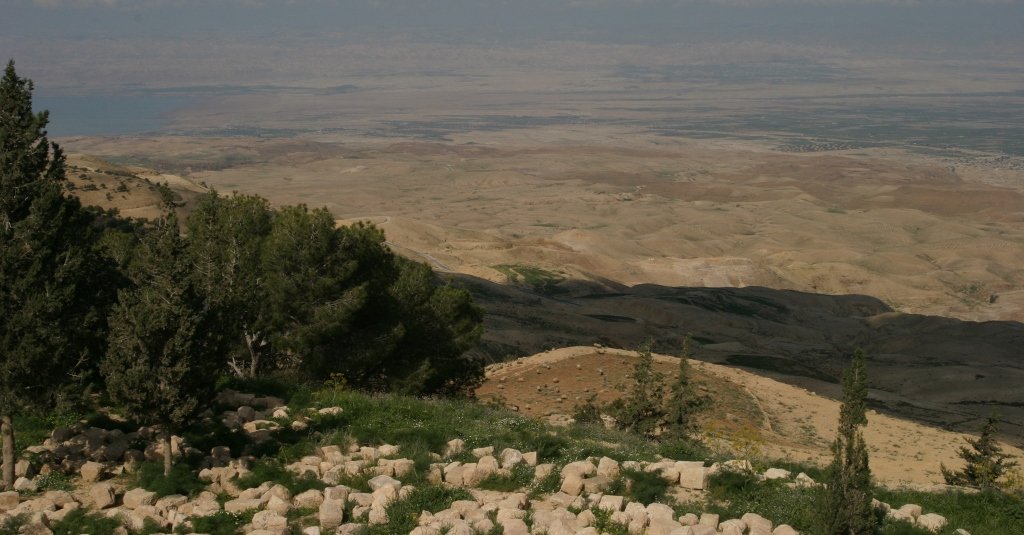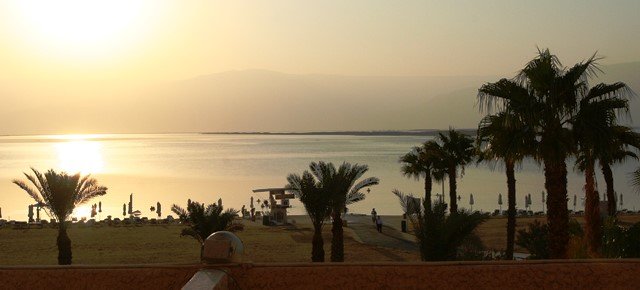Share This Story, Choose Your Platform!
Without religion, the conflicts of the Middle East cannot be explained. Violent extremists use theological justifications for their behavior. Those who want to understand the Orient should not ignore the influence of religion, especially not that of Islam and Judaism.
Israelis settle in the disputed West Bank for economic, nationalist and security considerations. They substantiate their actions with legal arguments. Theological reflections are rarely spoken out aloud in the public political debate in Israel. But they are present, even though their actual significance for current developments is difficult to assess.
Statements of the Holy Scriptures and religious traditions have a uniquely normative character that must never be overlooked, especially not in the Orient. The following is a description of what the Bible says about the “land question” on the background of Jewish tradition.
An old rabbinic view …
Rabbi Shlomo Yitzhaki is one of the greatest biblical commentators of the Jewish people. He was born on February 22, 1040 in Troyes, France, studied and taught in the city of Worms in the German Rhineland, before he returned to the Champagne, where he died on July 13, 1105. “Rashi,” as he is usually called in Hebrew, exerts an influence that goes far beyond his time, his people, and his religion.
Rashi’s rational and faithful interpretation of Scripture sought to distinguish strictly between literal exegesis (peshat) and spiritual interpretation (drash). Martin Luther in his biblical commentaries repeatedly referred to “Rabbi Solomon”. The German reformer seems to have felt a strong urge to distance himself from Rashi, even though Luther seemed not to be able to ignore him. To this day Rashi’s commentary is included in numerous Jewish Bible editions.
… and why the Bible begins with the story of creation
Rashi starts his interpretation of the Torah with considerations, which will be paraphrased here. From the Jewish point of view, the Torah is foremost a declaration of God’s will and thus a concrete instruction to His people. Not philosophical speculations are the purpose of the Word of God, but theologically reflected action of man.
Therefore, the question arises: “Should the Torah not have begun with the words [from Exodus 12:2]: ‘This month be to you [the first month of the year!’? – After all,” Rashi notes, is that “the first instruction of the Holy Scriptures directed to Israel. What is the point of putting the creation story at the beginning of the Torah?” – especially since their statements seem incomplete, irritating, provoking speculation and controversy, causing nothing but problems to human thinking and reasoning?!
The Franco-German exegete of the Bible finds the answer to his question in verse 6 of chapter 111 of the Book of Psalms: “The power of His works – i.e. the creation story – He proclaimed to His people”, it is literally translated, “in order to give them the inheritance of the Gentiles.” In plain text: The story of creation was transmitted before everything else in the Bible, because the Creator from the beginning intended to give a land to His people, which is actually inhabited and used by other human beings.
In an interesting mix of retrospect to biblical times and prospect into the future of his nation the medieval Rabbi Shlomo Yitzhaki sees how “the nations of the world reproach the people of Israel: ‘You are robbers! You have violently usurped the lands of other peoples!’”
The people of Israel, according to Rashi, should confront this accusation of the international community with an answer that is derived from the story of creation: “The whole earth belongs to the Holy One, blessed be He! He created it. Therefore, He has the right to give this land to whomever He wants. According to His will, He gave this land to Gentile nations. Because He liked it, He took this land from them and gave it to us.”
The land was never “empty”
What is remarkable about this interpretation of the creation story is, first of all, the observation that neither the biblical account nor rabbinic tradition assumes that the Promised Land was empty before Israel started to settle it. Rashi calls the land of Canaan “inheritance of the Gentiles”. Quite unemotional he counters all Zionist enthusiasm. The Israelites were never the original “natives” or “indigenous people” of the land of Israel. At no time have Jewish settlers come to an empty, uninhabited land. Rashi unmasks the idea that the land of Israel was “a land without a people for a people without land,” as the Scottish clergyman Alexander Keith had claimed in the middle of the 19th century[1], as a myth.
The Bible mentions the Amalekites, Amorites, Anakites, Geshurites, Girgashites, Girsites, Hittites, Hivites, Jebusites, Kadmonites, Canaanites, Kenasites, Kenites, Perisites and Refaites as indigenous of Canaan. Moses summed them up into symbolic, holy, perfect “seven nations,” “bigger and stronger than Israel” (Deuteronomy 7:1). Even at the time of the Judean king Josiah, the prophet Zefaniah (2: 5) spoke at least of the coastline as “Canaan,” the “Philistine land.” For the future, the prophet Zechariah (12: 3) foresees that “all the nations of the land will gather against Jerusalem.”
In general, the Torah of Moses seems to presume that even after the Israelites take possession of the land, people of other descent and culture would reside among them in the Promised Land. Otherwise, principles to grant equal rights (Leviticus 24:22) or even an inheritance (Ezekiel 47:22-23) to “the foreigner”, or the instruction to give tithing to the stranger – next to widows and orphans (Deuteronomy 14:28-29, 26:12-15) would make little sense.
Secondly, in consequence of Rashi’s exegesis remains to be recorded, the land of Israel belongs neither to its original inhabitants nor to the chosen people, but:
The land belongs to God
Already the forefathers of Israel, Abraham, Isaac and Jacob, did not consider themselves “legitimate owners”, but “strangers and guests”.[2] In the desert of Sinai, long before entering the Promised Land, God clarified to the Israelites, that they would not be “owners” of the land, but rather “strangers and sojourners with me”. Because, “This land belongs to me” (Leviticus 25:23).
The God of Abraham, Isaac and Jacob created everything, Rashi reasons, starting from Psalm 111 and referring back to the account of the creation, therefore, “the earth and what is in it” are His property. This claim is repeated several times in the Hebrew Bible (Psalms 24:1, 50:12, 89:11) and confirmed by the New Testament.[3]
God bestows His land
From this notification of acquis, Rashi deduces that God has the right to give His land to whomever He wants. At times, God has left the land to non-Israelite or non-Jewish hands. Diverse reasons are indicated in Scripture in such a scenario, perhaps because “the iniquity of the Amorites was not yet complete” (Genesis 15:16), because the people of Israel had attracted the wrath of God or also – to use a New Testament example – as long as “the times of the Gentiles are not yet full” (Luke 21:24). Incidentally, the apostle Paul also emphasized that the Creator has the right to establish “how long [nations] exist and in what boundaries they should live” (Acts 17:26).
On the basis of this justification God promises the land of Israel to the people of Israel. The land promise to Abraham is one of the major themes of the Old Testament divine revelation: “To you and your descendants I will give this land, in which you are now a migrant, the whole land of Canaan” (Genesis 17:8). The descendants of Abraham, for whom this promise is valid, are being specified. At Abraham’s request, “Oh, that Ishmael may live before you!”, God answered: “No! Sarah, your wife, will give birth to a son, whom you shall call Isaac. With him will I establish my everlasting covenant and with his family after him” (Genesis 17:19). These statements make an “Abrahamic ecumenism”, which has recently been propagated especially by some Christians, impossible – at least in respect to the land question.
Therefore, already in his lifetime, Abraham sent all his other sons away from his son Isaac, for “he gave all his goods to Isaac” (Genesis 25:5-6). God confirmed His covenant with the descendants of Abraham through Isaac and Jacob up to the time of the New Testament.[4]
The land as inheritance
At the same time as the promise, Abraham received the commission to explore the land (Genesis 13:17) and “to possess it.”[5] God bestows “His land” as “inheritance”[6], i.e., not as freely available property, but as a fief, as trusteeship. The administration of such an inheritance is always associated with obligations. Not rights are the decisive factor, but a commission. An inheritance cannot be simply sold or even abused as trade object, not even to save one’s own life.
Therefore, it was only fair that Priests and Levites did not receive an “inheritance in the land”. They are exempt from the assignment of trusteeship. Their “inheritance” was the Lord[7], their assignment the service in the sanctuary. When God entrusts His land to people, He expects them to explore it, to occupy it, to develop it, to build it up, to preserve and to defend it.
The notion of a land “flowing of milk and honey” is, biblically speaking, not the description of a Cockaigne in which roasted chickens spill into one’s mouth, but rather denotes a potential that has to be developed through hard work under the blessing of God, as for example the context of Isaiah 7:21-22 shows. There, after God’s judgment will those eat “butter and honey” “who are left over in the land”. Similarly, Deuteronomy 11:10-17 shows how the behavior of the inhabitants and the devotion of God are of vital importance to the yield of the land.
A relationship with God as prerequisite for land ownership
The possession of the land of Israel presupposes a living relationship with the God of Israel. The promise, “I will give as an inheritance a land that flows of milk and honey” is inextricably linked to the statement: “I am the Lord your God, who has set you apart from the nations” (Leviticus 20:24). The possession of the Promised Land is, from a biblical perspective, always bound to a functioning relationship with God. Therefore, after the Exodus from Egypt, “none of this evil generation was allowed to see the good land,” except Joshua and Caleb (Deuteronomy 1:35), who were willing to trust the Word of God.
Only “the righteous will dwell in the land, and the pious remain therein. But the wicked will be exterminated from the land, and the wicked will be destroyed out of it.”[8] Not just any biological descendant of Abraham, Isaac and Jacob, but “he who trusts in Me,” says the Lord, “shall inherit the land and possess my holy mountain” (Isaiah 57:13b).
Under this condition, there is even a future for the original “indigenous people” in the land: “And it shall happen when they learn from My people to swear by My name: As truly as the Lord lives!… shall they dwell in the midst of my people” (Jeremiah 12:16).
On the other hand, it is true also for the Jewish people: “If you forget the Lord your God and follow other gods and serve and worship them, so I testify to you today that you will perish; just as the Gentiles whom the Lord kills before your face, you will perish because you are not obedient to the voice of the Lord your God” (Deuteronomy 8:19-20). It is tempting to summarize these statements with the words of the apostle Paul: “Know, therefore, that those who are of faith are Abraham’s children… and heirs according to the promise” (Galatians 3:7,29).
Throughout the millennia, Israel has learned, in an unspeakably painful manner, over and over again, “what grief and heartache it produces, to forsake the Lord your God and not fear him” (Jeremiah 2:19) — and instead adapt to the philosophies, standards, and ways of life of pagan nations. If today, therefore, the whole world – in contradiction to all historical or political truth and international law – reproaches Israel: “You are robbers and have usurped this land by force!”, Jewish people, who wish to remain faithful to their God, His Word and mission, have no choice but one answer: “The Lord forbid that I should give you the inheritance of my fathers! (1 Kings 21:3). Because the whole earth belongs to the Holy One, blessed be He. He created it and He gives it to whomever He wants. At His will, He has given this land to Gentile nations. And when it pleased Him, He took it again and gave it to us.”
Footnotes:
[1] Alexander Keith, The Land of Israel According to the Covenant with Abraham, with Isaac, and with Jacob (Edinburgh: William Whyte and Co., 1843), 43.
[2] See for this especially Genesis 23:4, 28:4; further Genesis 17:8, 20:1, 21:23,34, 26:3-4, 36:7, 37:1. Finally Exodus 6:4; 1 Chronicles 16:19, 29:15, Psalms 39:13, 105:12, 119:19, as well as Acts 7:5 and Hebrews 11:8-10.
[3] Matthew 11:25, Luke 10:21, Acts 4:24, 14:15, 1 Corinthians 10:26, Hebrews 1:10, Revelation 10:6, 14:7.
[4] Genesis 26: 2-4, 28:4,13, 35:12, Exodus 6:2-4,8, Nehemiah 9:8, Psalms 105:8-11. Compare Romans 9:6-13, where the apostle Paul cites the election of Isaac and Jacob as evidence of God’s sovereign saving action. Further, in Romans 11:1 and 29, Paul explicitly emphasizes that “the gifts and calling of God are irrevocable,” referring to the part of the Jewish people who do not recognize Jesus of Nazareth as Messiah.
[5] lerishtah, Genesis 15:7, likewise Genesis 28:4; compare also Exodus 6:8.
[6] Deuteronomy 12:10, 1 Kings 8:36, 1 Chronicles 16:18, 2 Chronicles 6:27, Psalms 135:12, 136:21-22, Jeremiah 3:18, Acts 13:19.
[7] Compare for this Numbers 18:20-21, Deuteronomy 12:12, Joshua 14:4 and Joshua 21.
[8] Proverbs 2:21-22; compare Psalms 25:12-13, 37, Proverbs 10:30, Isaiah 1:19.






















